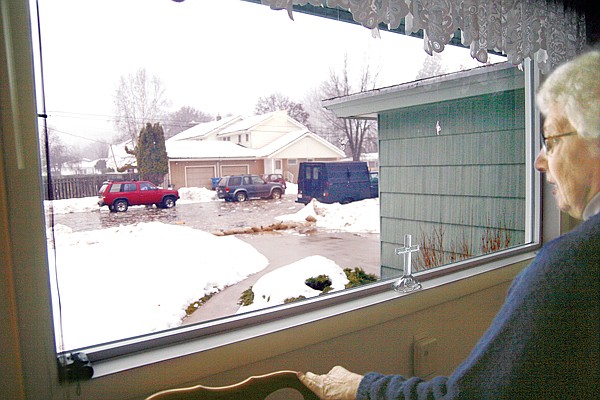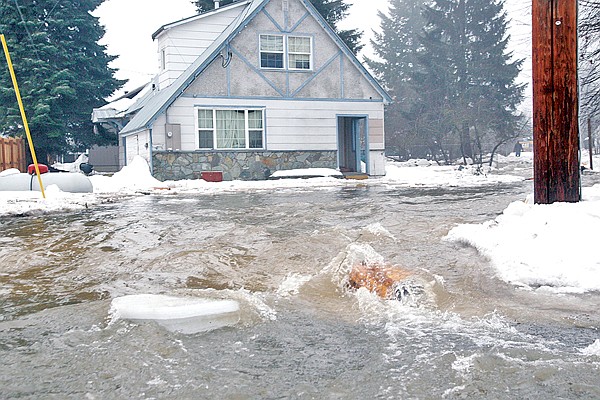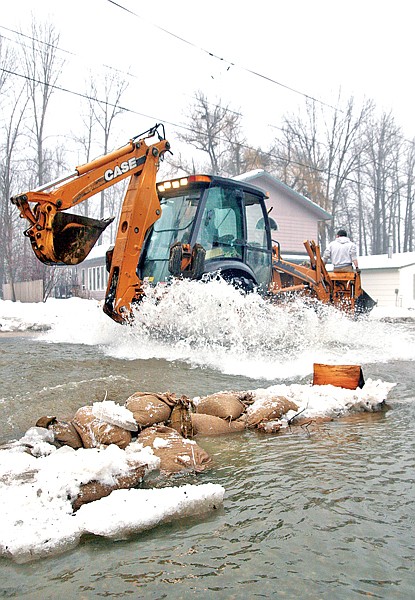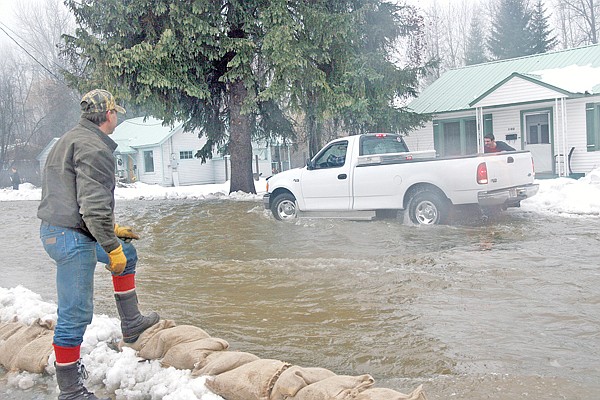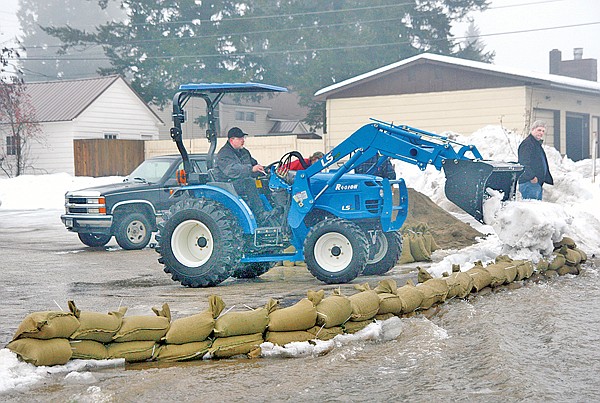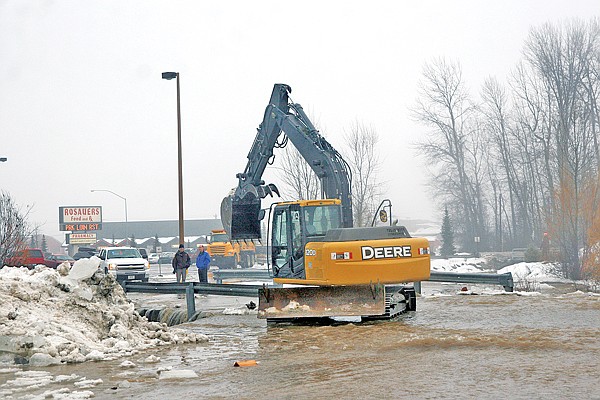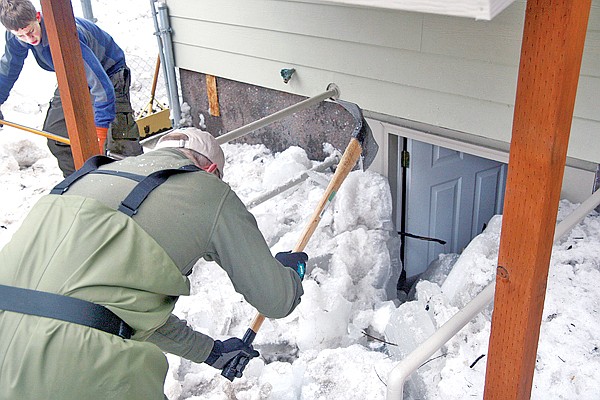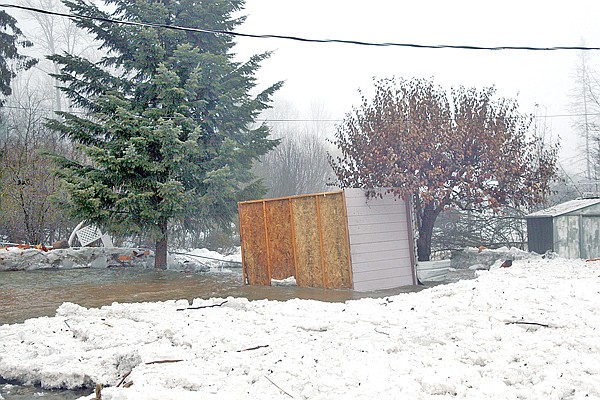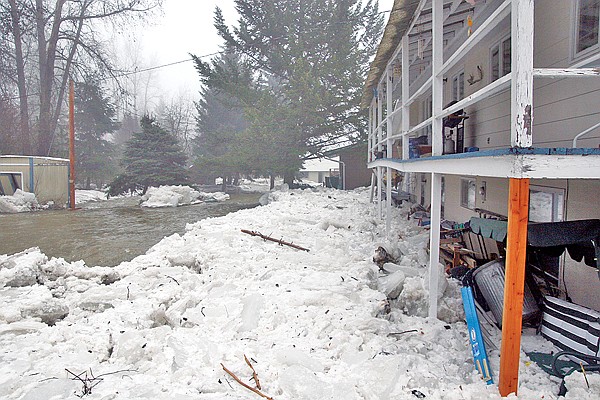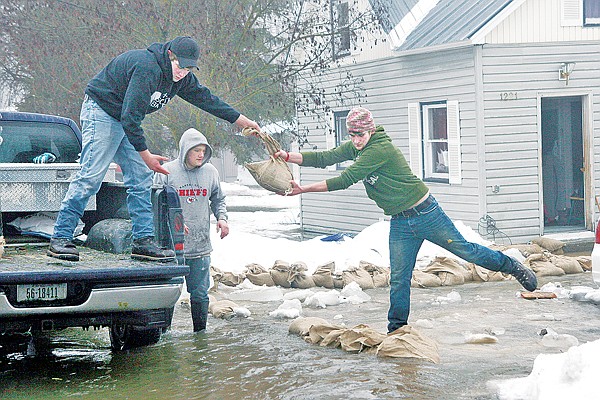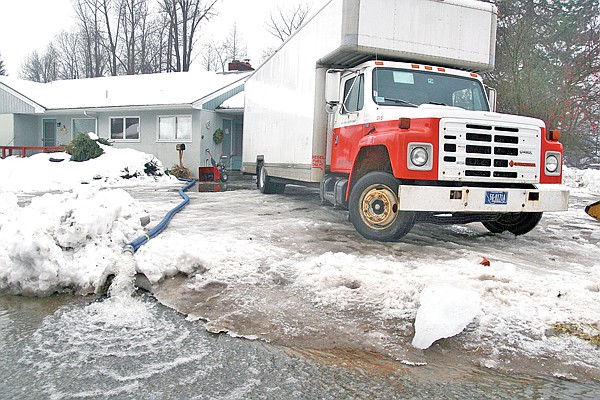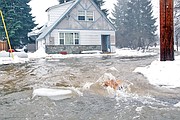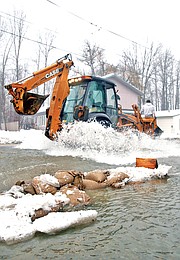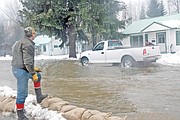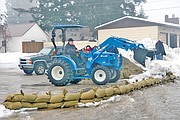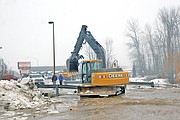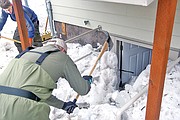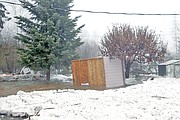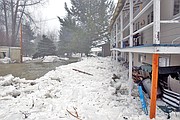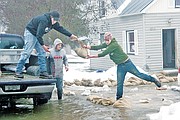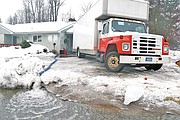Ice jam leads to flooding in Libby
An ice jam below a Flower Creek bridge
in Libby sent torrents of water through town on Monday morning –
destroying yards, flooding basements and temporarily making roads
impassable.
No one was hurt in the flash flood that
carried away a backyard shed, closed down Highway 2 and caused
residents to evacuate, according to emergency response officials.
Nevada Avenue homes directly downstream from the ice jam were
hardest hit – with basements reportedly being flooded with 3 to 6
feet of water – but the current also rushed east down Nevada’s
crossroads and fanned out as far north as Collins and Hamann
avenues. Cabinet Avenue property on the west side of Flower Creek
also took a beating.
Water pressure became so great on the
massive chunks of ice that dammed up below the bridge on West
Balsam Street that the water began spilling out along the
sides.
A downstream resident on Cabinet Avenue
was the first to report signs of flooding at 3:36 a.m., according
to Lincoln County Sheriff Roby Bowe. At about 9:20 a.m. a surge of
water broke through, causing Nevada Avenue to become a shallow
river.
By 1:30 in the afternoon, Bowe said,
the incident was considered over and all emergency personnel were
sent home.
Rosie Roberts, 80, stood shivering
outside her home Monday morning with horror written on her face.
She looked at the water flowing from Nevada Avenue onto the street
in front of her house and the sandbags that a “kind soul” had
placed at her driveway. It was 9:10 a.m. The worst was yet to come,
volunteer firefighter Scott Beagle explained.
“We’re going to get a lot more water
coming down here pretty soon,” he told her.
At the urging of volunteers, Roberts
entered her home to collect supplies before leaving for the
voluntary evacuation. Still flustered, she took a minute to look
outside through the window.
“I don’t want my house to flood,” she
cried, and then turned to locate her coat, boots, purse and
medications.
By the time she made it out the door,
the knee-deep water ran too swift to walk across. Beagle took her
arm and guided her to a pickup, which transported her to higher
ground.
Beagle assured the frightened woman,
“It’ll all be over in about an hour.”
Officials had been monitoring the
build-up of ice at the bridge over the past weekend in preparation
for a potential flood, said Vic White, director of Lincoln County
Emergency Management Agency. The city experienced ice jams at the
same bridge in 1997 and 1974.
“The ice had built up to where it was
level or higher than the driving surface of the bridge for 100
yards (in both directions),” White said.
White met with officials from the
sheriff’s office and police department over the past weekend to go
over plans, and he and officers had been continually checking the
status of the ice jam.
“The last check that I made was 2 in
the morning,” he said, “and there was no signs of ice giving way –
just a lot of water.”
As soon as White learned of flooding,
he contacted the city crew to get a dump truck of sand out to
neighboring residents for sandbags. He alerted city and county
officials and then assembled teams of emergency responders.
Sometime after 4 a.m., homeowner Randy
Wiza heard the city’s emergency siren. It didn’t take long before
he learned what the fuss was about.
“I saw the sand truck come up the road
and then I knew,” he said, pointing out that his home withstood the
flood of ’97.
He and neighbors spent the morning
protecting their backyards with walls of sandbags. The barriers
worked OK until the surge came after 9 a.m., he said, then nothing
could hold it back.
“There used to be a shed there and a
fence,” he said, pointing. “Now it’s all gone.”
Slowly, the water drained from the
streets and by noon, most of the roads were re-opened for travel.
Boxes of pizza were stacked high on tables at the fire hall. Of the
department’s 30 volunteers, 28 were able to respond. They had
notified residents, sandbagged homes and blocked off dangerous
roads. They also made sure that electrical circuits and propane
tanks were safe from flooding.
During the 1997 flood, 17 or 18 propane
tanks were washed away, fire chief Tom Wood recalled. This time
around, firefighters dealt with only one tank that washed away
spewing propane.
Though Monday’s flood was nothing to
scoff at, he recalls the effects of Flower Creek’s ice jam in 1997
being more far-reaching.
“That particular flood, we were out
there two days solid,” he said.
Excavator operators, positioned at
every Flower Creek bridge in town to break up the ice, finished
their work by 1:30 p.m., according to Bowe.
By that time, residents returned home
and began pumping water out of their basements.
Schools and city and county buildings
had already been closed Monday in honor of Martin Luther King Jr.
Day.
The response side of the emergency went
well, White said, because the community learned from the last
flood.
“We had the experience from ’97,” he
said. “A lot of those folks had been through that and they
understood what happened. They developed a really good plan on how
to attack that – the Flower Creek bridge all the way down.”

